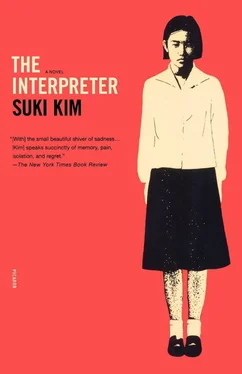Suki Kim - The Interpreter
Здесь есть возможность читать онлайн «Suki Kim - The Interpreter» весь текст электронной книги совершенно бесплатно (целиком полную версию без сокращений). В некоторых случаях можно слушать аудио, скачать через торрент в формате fb2 и присутствует краткое содержание. Город: New York, Год выпуска: 2011, ISBN: 2011, Издательство: Picador, Жанр: Детектив, Триллер, на английском языке. Описание произведения, (предисловие) а так же отзывы посетителей доступны на портале библиотеки ЛибКат.
- Название:The Interpreter
- Автор:
- Издательство:Picador
- Жанр:
- Год:2011
- Город:New York
- ISBN:0-312-42224-5
- Рейтинг книги:3 / 5. Голосов: 1
-
Избранное:Добавить в избранное
- Отзывы:
-
Ваша оценка:
- 60
- 1
- 2
- 3
- 4
- 5
The Interpreter: краткое содержание, описание и аннотация
Предлагаем к чтению аннотацию, описание, краткое содержание или предисловие (зависит от того, что написал сам автор книги «The Interpreter»). Если вы не нашли необходимую информацию о книге — напишите в комментариях, мы постараемся отыскать её.
The Interpreter — читать онлайн бесплатно полную книгу (весь текст) целиком
Ниже представлен текст книги, разбитый по страницам. Система сохранения места последней прочитанной страницы, позволяет с удобством читать онлайн бесплатно книгу «The Interpreter», без необходимости каждый раз заново искать на чём Вы остановились. Поставьте закладку, и сможете в любой момент перейти на страницу, на которой закончили чтение.
Интервал:
Закладка:
But his white-picket-fenced Westport house, his blonde wife in her primary-color outfits, and his baby boy who so resembles Michael have nothing to do with Suzy. Connecticut is a long train ride away, and her cell-phoning lover remains her secret through the cool winds of November. Oddly, no guilt, no sleep lost over his family, who really have nothing to worry about. Suzy is only happy to send Michael home. She has no intention of keeping him, as she had with Damian.
They didn’t see each other until seven months after meeting on the steps of St. John the Divine. It happened in the third week of November of that same year. There were only a few weeks left in the first semester, and Suzy was anxious, still unsure about her senior thesis, which focused, of all things, on Shakespeare. The comparative aspect had to do with the Eastern treatment of King Lear, as adapted by Akira Kurosawa in his minimalist film Ran . Suzy had been intrigued by the fundamentally opposite viewpoints expressed in the two interpretations of the same plot, which supported her central argument of the impossibility of harmony between the East and the West. It seemed a militant way of analyzing the problematic relationship, and Suzy was not sure how much of it was really her idea, or if it had been Professor Tamiko who encouraged such a position. Suzy had met her only once privately, for half an hour. The scheduled twice-a-semester meetings never worked out. Back in September, soon after the senior year began, Suzy sat before Professor Tamiko, feeling awkward, if not slightly terrified. It was the first time she saw her up close. Of course Professor Tamiko showed up late and offered no apology.
“So you believe that Shakespeare was exhibiting a secret Zen desire through Cordelia’s insistence on ‘nothing,’ or by declaring so boldly, which is really to negate the premise of ‘nothing,’ he was illustrating the very Western ideal of negative space?”
No warm-up chitchat, no polite hellos; Professor Tamiko liked to get straight to the point. Suzy was not sure if she expected her to say anything in reply. Besides, she really did not know what she thought about the whole thing, if she had any concrete position. Certainly, it was her thesis. She was still brewing with thoughts, some interesting, some absurdly minor, and yet, sitting before this woman who was now spewing infinite possibilities, Suzy felt dumb, as if she became Cordelia herself, who could declare nothing over and over as if it were the only conceivable cry against all that had brought her there, to this ground-floor office whose window revealed the sunny autumn outside, which seemed suddenly impossible to believe. Professor Tamiko was now saying something about Kurosawa’s use of the scene depicting a tree as the Eastern answer to Cordelia’s verbal filial piety. The tree, yes, Suzy liked that scene in the movie, how the younger son stands holding up the bony branch that casts a soft shadow over the old king’s sleeping face. It was a heartbreaking scene, the son’s last gesture of love for his aging father, the old immutable tyrant on whose face death has begun its menacing grip.
It felt unbearably hot suddenly, and Suzy took out a tissue from her bag to wipe the sweat off her face.
“Yours is quite an interesting thesis, but anything can be interesting if you just put your mind to it, even Shakespeare. Let’s take it one step further… How effective is Cordelia’s ‘nothing’? How pure is Shakespeare’s intent? Or perhaps have we all been fooled by Shakespeare, could he be the biggest con man of the world’s literature? Why is it always the white man?”
The sudden tightness in Professor Tamiko’s tone surprised her. No one uttered the words “white man” with such contempt, except perhaps her father. Suzy thought she had seen the fleeting anger across the older woman’s pale face, whose violet lipstick shone so brightly against the cream silk blouse and the matching cardigan, and the afternoon sun almost too faint against her piercing black eyes.
“Don’t look so timid, now; it won’t get you very far, not with me, and definitely not with them.”
Suzy realized that she was being dismissed. What did she mean by “them”? Her father often said things like that. He would say “us” and “them” as though there were always a line between the family and the rest of the world. The implication was clear. The guilt lay with “white men,” as he never forgot to tell her: “Don’t ever trust them, don’t you ever let them touch you.
Suzy got up to leave. The meeting seemed to have nothing to do with her thesis. Shakespeare and Kurosawa seemed to have so little bearing on what had just been confessed in the office; she would be glad never to return. And it was then that Suzy saw the black-and-white photo of Damian on the corner of the bookshelf. He appeared very young, his chestnut hair down to his shoulders, the flared collar of his flannel shirt so unmistakably seventies. Next to him was Professor Tamiko, girlish with clean bangs and no lipstick. She looked happy, her head leaning against his shoulder, shockingly youthful, and clearly in love.
“It’s from a long time ago. I should’ve put it away.”
Professor Tamiko muttered as though she were excusing herself, as though she thought Suzy had already left the room.
The next meeting was not scheduled until November, which was when Suzy saw him. She had been waiting in front of Professor Tamiko’s office. The thesis was going nowhere, and she was seriously considering dropping the whole topic. Their meeting was supposed to be at two o’clock, but upon arriving she found the door locked. Suzy crouched on the floor with her bag at her feet, hoping that someone would show up eventually, perhaps one of the TAs who usually answered the door during her office hours. But half an hour passed, and no one came, and Suzy began to feel hungry and sleepy. She had not slept for days, sitting up all night before the blank computer screen, glancing at the familiar tree scene from Ran , which was now on her VCR permanently with its sound muted. She was beginning to get sick of it. Filial piety or not, what did it matter to her, who really cared if Shakespeare was a con man or not, why lose sleep over something so abstract and ancient? Suzy was never a rebel, never imagined herself as one, and now was certainly not the time for her to behave as such, when her college degree was down to just one more semester.
Suzy must have dozed off, for she suddenly opened her eyes to furious knockings nearby. He did not seem to notice her crouching on the floor against the right wall. He was banging on the door repeatedly, stamping his feet, muttering something under his breath resembling a curse, though Suzy could barely make it out. A few minutes went by before he stopped.
“She’s not there,” Suzy volunteered hesitantly. He looked down at her as if he could not understand where she might have come from. His face lacked any discernible expression. But there again—she could not help noticing it—the hollowness in his eyes, the sort of loneliness collected for years, why should it seem so familiar to her? Even back in April, when she first saw him on the steps of St. John the Divine, even as they both burst out laughing, she found, in his shockingly blue eyes, the mark of something absent, akin to resignation, irrevocably past innocence. And now, sitting here, gazing up at him with her arms hugging her bent knees, she wanted to get up and take his hand and lead him away from this dark hallway, this locked office to which she had hoped she would never return. So, instead, Suzy fired a shot, with a boldness that surprised her: “I hope you didn’t follow me again.”
He stared at her intently, as though he had not recognized her until then. Of course, it had only been a chance encounter. He had once followed her out of his wife’s lecture on a whim, on a silly, crazy, shiny April whim. Call it spring fever, call it the aging scholar’s midlife confusion. The girl had caught him then, red-handed and guilty, and the two had laughed with an understanding that neither could really explain, and continued on their separate ways, innocent and strangely rejuvenated. And here was the girl again, sitting in front of his wife’s office, watching him lose his temper with such sweet tenderness on a face frighteningly young. He was embarrassed, but not terribly.
Читать дальшеИнтервал:
Закладка:
Похожие книги на «The Interpreter»
Представляем Вашему вниманию похожие книги на «The Interpreter» списком для выбора. Мы отобрали схожую по названию и смыслу литературу в надежде предоставить читателям больше вариантов отыскать новые, интересные, ещё непрочитанные произведения.
Обсуждение, отзывы о книге «The Interpreter» и просто собственные мнения читателей. Оставьте ваши комментарии, напишите, что Вы думаете о произведении, его смысле или главных героях. Укажите что конкретно понравилось, а что нет, и почему Вы так считаете.












